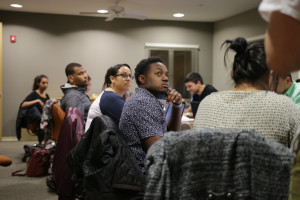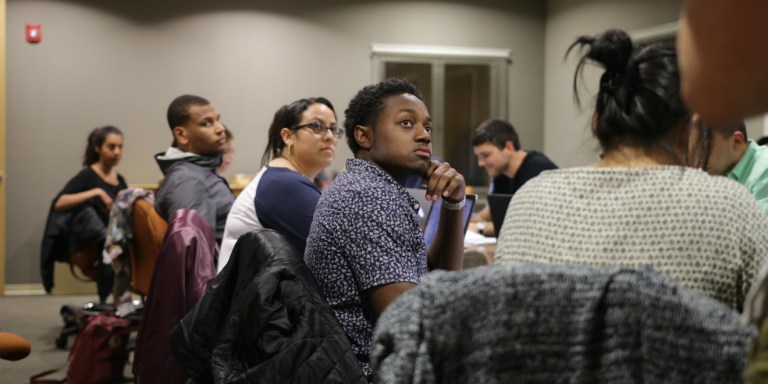
The third meeting of the 17th Undergraduate Senate this quarter featured a fierce debate over funding for financial aid for Greek organizations. The Senate decided to table a bill on anti-Semitism and approve the nomination of Benjamin Kaufman ’17 to the Board on Judicial Affairs. The Senate also passed a congratulatory motion for Carl-Fredrik Arndt and Peter Jonsson, the two graduate students who intervened in Brock Turner’s sexual assault.
The Senate began their meeting with a closed session to discuss the hiring of the next Chief Executive Officer of Stanford Student Enterprises (SSE). This individual will replace Fred Groce ’14. The closed portion of the meeting lasted about half an hour.
ASSU Vice President Brandon Hill ’16 provided Executive updates. Hill announced that members of the ASSU government would be attending a special dinner on April 28 and that it would be paid for.
Sean Means ’18, the assistant financial manager for SSE, submitted a bill for previous motion to appoint an equipment manager. The Senate will have the option to approve it next week.
The Senate discussed and approved several funding bills.
Funding for Greek life
Joshua Seawell ’18, a member of the ASSU Executive branch, spoke about the request for funding for Greek life. Seawell and other supporters of the bill said it was an important measure to make Greek life accessible for many low-income members of the Stanford community. Seawell criticised what he called a “myth” that the Senate only funds student groups open to everyone, that he believed that was the primary obstacle to the passage of the bill.
Some chapter presidents spoke Alizabeth McGowan ’16, a representative of the sorority Sigma Gamma Rho and the African American Fraternal and Sororal Association gave a talk about the impacts of inadequate financial support for low-income students seeking to join Greek organizations. According to McGowan, initial dues to to join Greek organizations can range from $700 to $1000. McGowan reported that low-income students had difficulty in scraping together that amount of money and that sometime students deferred joining.
“Often students are unable to join organizations because they do not have the money at the moment,” McGowan said.
McGowan also reported that the challenges members have in joining can severely reduce the number of individuals in Greek organizations and threaten the viability of the Greek organizations themselves.
“Without any financial support, the chapter basically dies,” McGown said.
McGowan disagreed with the idea that funding for financial aid for Greek organizations would support opportunities for some but not all students. McGowan argued that financial aid for students would increase access to Greek life for low income students and thereby make the organizations more accessible to the student body.
Samantha Hoffman ’17, a member of Alpha Kappa Delta Phi, and a representative of the Multicultural Greek Council talked about her experiences last year. She reported the national organization required a number of events, that it was quite difficult to attend these events and that the national organization put them on warning status due to attendance problems. She reported that some members of her chapter have had to take a leave of absence from the organization and sometimes Stanford because of financial concerns and that the cost of the dues only added to those financial burdens.
Hill ’16 said he and ASSU President John-Lancaster Finley ’16 were giving “high level support” to the initiatives to provide financial aid to needy students in the Greek system.
“No opportunity at Stanford should be foreclosed to any student on the basis of financial need,” Hill said.
Disagreement on its necessity
David Wintermeyer ’17 called for the ASSU party on April 28 to be cancelled and the money to be diverted to support financial aid for students in the Greek system. Wintermeyer said more details needed to firmed up on the question of how specifically the $18,000 proposed to be spent towards the purpose of financial aid for Greek Life would be spent. He said the use of a funding bill was inappropriate and called for the Senate to reject it.
Hattie Gawande ’18 said the item started as a bill but had changed into a funding request
Wintermeyer remained concerned.
“A screen grab for $18,000 is a little scary for me,” Wintermeyer said.
Seawell responded to Wintermeyer’s concerns and noted that the dues amounts for specific Greek life organizations are confidential. Seawell said that the funding that the Senate had remaining for the year far exceeded what the ASSU Executive had remaining.
The Senate discussed possibly going over the dues amounts in closed session next week.
Hoffman said that students could use a payment plan for her Greek group if needed.
Eni Asebiomo ’18 asked about other possible sources of funding for the financial aid program.
A supporter of the bill reported that the Provost will offer $15,000 for the Diversity First Generation Office if the bill in question passed. Seawell said the fund will be a pilot and will help collect good data to better appreciate the size of the fund needed.
The proxy Senator Justice Tention ’18 read a letter that was critical of the measure.
“[The] committee only allocates programming board funds to events and activities that are open to the entire student body … We do not fund any exclusive gatherings where students do not have the ability to join,” Tention said.
He added, “I strongly believe that Greek organizations should be accessible to students of low income background for the benefit of low income students and the organizations themselves. However, the programming board is not where that money should come from. No student should have to pay for exclusive organizations.”
Seawell responded in the meeting by referencing an earlier email in which he pointed out the ASSU Senate had previously funded club sports teams.
Jasmine Espinosa ’18 asked how the financial aid for Greek life might impact financial aid. She also said she was conflicted on the measure and planned to abstain.
Seawell said that the Diversity First Generation Office has in past run into trouble with financial aid being reduced, when, for example, the office gave out support for textbooks. Seawell said the Financial Aid Office had told them that financial aid would not be reduced for individuals receiving support from the possible aid fund for Greek life.
Miscellaneous
The bill to condemn anti-Semitism that sparked heated discussion last week was tabled.
Gawande introduced a motion to censure her fellow Senator Gabriel Knight ’17, further consideration of which is expected next week.
Wintermeyer introduced a bill to congratulate the graduate students who intervened to stop Brock Turner’s sexual assault. It passed unanimously.
Luka Fatuesi ’17 proposed that a refundable deposit be not required for the rental of equipment to avoid being a burden on low income students.
Gawande reported that one member of the Sophomore Class President slate had to step down, and that the Senate had to confirm a replacement. Gawande reported that there was a similar instance of this happening several years ago.
The next meeting is expected to be the final meeting of the current Senate.
Clarification: This article has been updated to clarify Hoffman’s comments about the impacts of fees on her members. An earlier version of this article attributed her members leaving Stanford to the fees.
Contact Caleb Smith at caleb17 ‘at’ stanford.edu.
